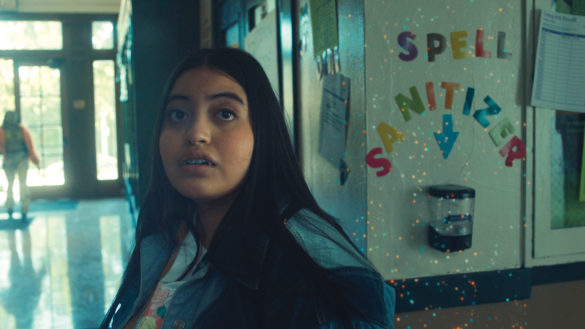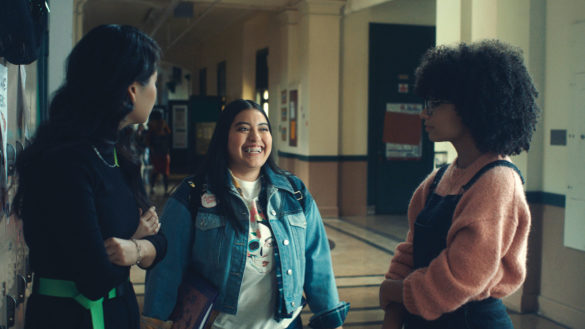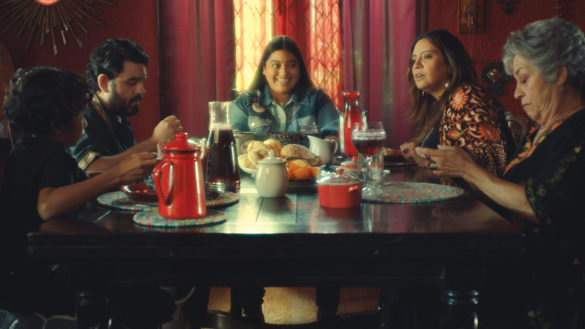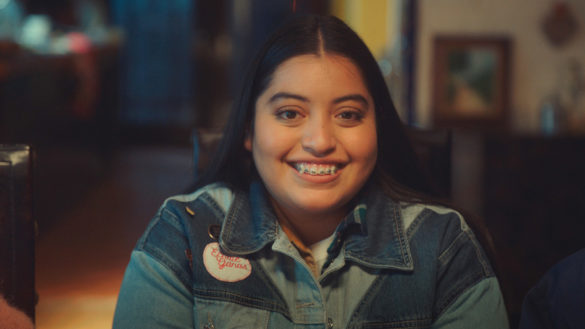All of her life, writer and director Ann Marie Pace has been characterized by titles that seemingly split her into halves. Mexican American. Bisexual. Half this. Half that.
“For the longest time, I felt like being a part of multiple identities meant you were a fraction of that identity,” says Pace, who graduated from UT in 2011 with a bachelor’s degree in journalism and electronic media. “I had to learn later on in life that it doesn’t. Each of your identities is fully who you are. That’s a really powerful thing, to take ownership of every part of yourself.”
Before Pace arrived at this level of self-realization, the half identities blurred her vision of who she truly was. She spent much of her life troubled by the thought that she was too much of too many things, yet not enough of any of them to be whole. But that complex identity became an asset when she began using her experiences to fuel her own filmmaking.
In May, Pace’s newest short film, Growing Fangs, was released on Disney’s Launchpad series. The story follows the teenage struggles of Val Garcia as she juggles her half-human half-vampire identities. It’s a story of living in the in-betweens—a story that’s very familiar for Pace, who pulled inspiration from her own experiences.
Growing up in a small town outside Nashville, Pace was typically the only Mexican American student in school. Because of this, a large portion of her youth was devoted to morphing into a more palatable version of herself.
“A lot of my childhood into high school felt like it was about needing to belong or fit in,” she says.
But summers were different. Pace spent her time off traveling on research expeditions with her father, who was an anthropologist. Among the vibrant cultures of the Amazonian and Brazilian indigenous peoples, Pace was exposed to new worlds.
“I think it was the start of me exploring my own identity,” she says.
Making films is a window into her mind, a chance for others to see the world with the same empathy she holds. Each story is an attempt to spread the understanding that we all lead different lives and have different experiences and feel different feelings, and that’s OK. Beautiful, even.
“Whatever it is that you feel like you need to hide, or feel ashamed of, or that makes you an outsider, I think eventually in life you learn that it’s actually your superpower,” Pace says. “It might be tough right now, but know you are loved and incredibly special for how you see and experience the world.”
Pace’s dualities turned out to be her superpowers, but she tried to suppress them for a long time. She never wanted to stick out.
“The fear of not being accepted can be a really powerful thing and it can definitely keep us from living our true lives,” she says. Today she realizes that those dualities actually make her whole, and they offer her a perspective to share with others who need it as much as she once did.
Pace has always had a knack for storytelling—scribbling tales about monsters even in grade school—but she wasn’t always sure what she wanted to say or how she wanted to say it.
Taking the First Step
It wasn’t until she came to UT that she began stepping into the power of her voice. On campus, Pace found the big community she had always craved and the space she needed to experiment with her interests. “It was the first step, I think, in finding my community and figuring out who I was,” she says.
As a student in the School of Journalism and Electronic Media, she first thought her path might lead her to reporting. Under the guidance of Joshua Queener (’01), the former director of UT’s student television station, TVC (the Volunteer Channel), she realized that the hard facts weren’t enough. She wanted to entertain, too.
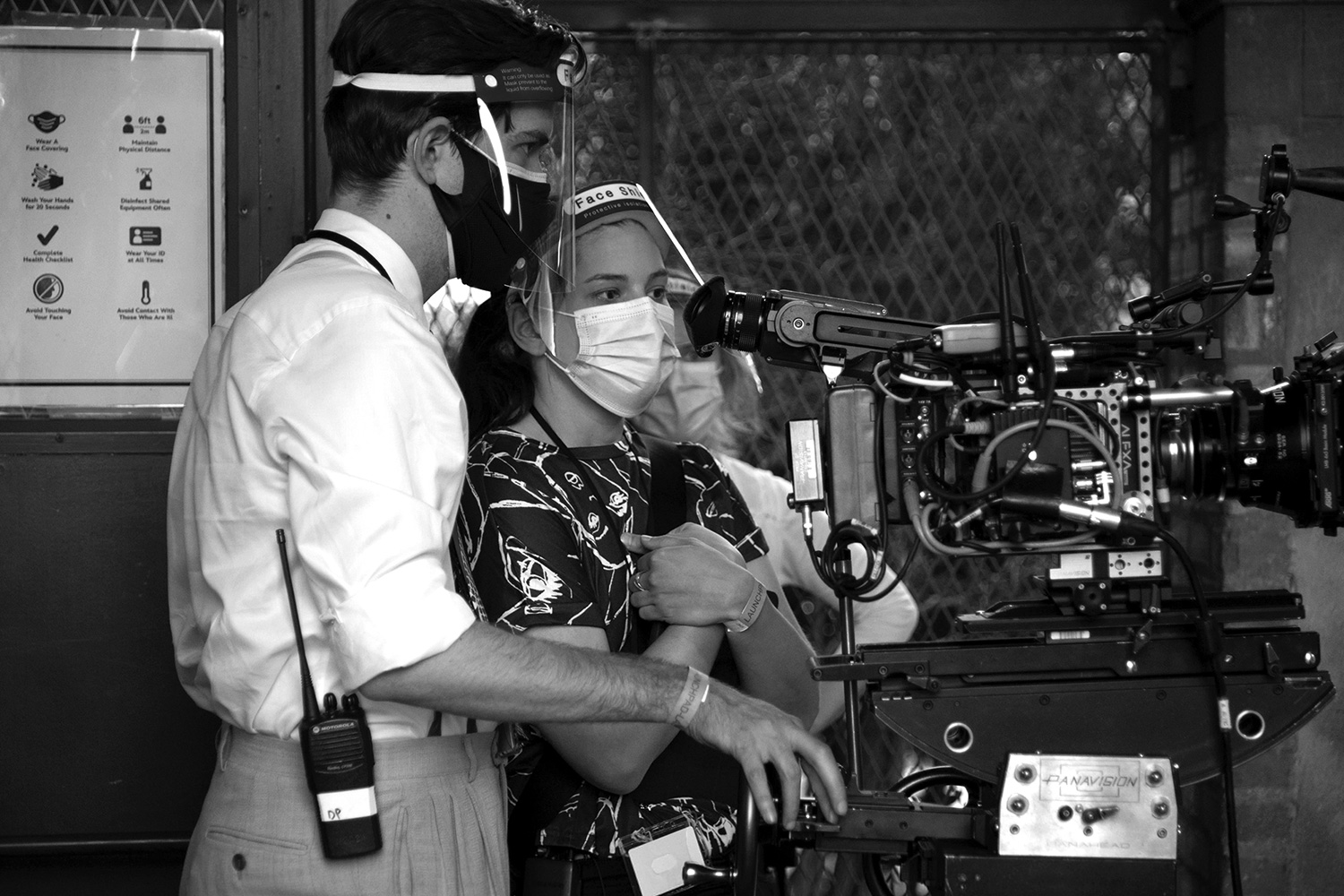
Queener recalls that when Pace approached him with the idea for Greek Corner, a series following Greek life on campus, he didn’t realize she was a first-year student. Students weren’t typically concerned or confident enough to be so involved until later on. Greek Corner would grow to be one of the TVC’s most consistent and successful shows during Queener’s time as director.
Pace’s determination to see her ideas come to fruition and her ability to deliver them as quality productions left a lasting impact on Queener. “Over the nearly 15 years I did that, there were definitely less than 10 people who had that kind of talent,” he says.
The experience gave Pace her first taste of the production field, as well as a sense of confidence and trust in her own abilities.
A lot of times in this industry we feel like we have to wait for permission to make our own things. TVC had the camera, had the equipment, and had someone that was saying ‘Go do it, go experiment and explore. Find the stories, find your voice.’ And that lesson I still take today.”
Finding Purpose
Growing Fangs is a product of creating without appeasing. The main character is intentionally bold, the kind of person Pace resonates with but feels she hasn’t seen a lot of. While fictional characters are typically a great source of relatable models for those working through identity issues, Pace recalls not seeing much of herself—from her heritage to her sexuality—on screen.
“I think I internalized that those parts of myself weren’t important,” says Pace. “So I do want to do that with my work—creating those characters so that other kids like me growing up know that they’re important and their stories are important.”
If it seems there’s a motive to Pace’s work, there is: Make others feel seen. It’s a goal she strives for in every film, a piece of the why she believes all creators are trying to answer with their work.
Pace began unraveling her own why while working toward her MFA in directing at the University of California, Los Angeles. Within a more intimate setting of just 13 peers, she uncovered new layers of herself. It was a time that bred self-realization and authenticity, resulting in her coming out as bisexual and finding her artistic voice.
For the first time, she was confident in her purpose. She knew she was made to share stories, to connect people.
Growing Fangs covers some serious topics of self, but Pace serves what could be heavy scenes with a dose of humor. Chris Wohlwend (’68, ’03), a lecturer at UT, was impressed by Pace’s ability to intertwine seriousness and lightheartedness in both her work and personal life.
“Annie takes her work very seriously, but she does not take herself seriously,” Wohlwend says.
He recalls reading a review of Growing Fangs in the New York Times that noted Pace’s wit. He wasn’t at all surprised; that was the person he knew from class. He remembers shooting a group photo on a study abroad trip to Cyprus. As the students piled together in front of their little apartment complex on the island, he noticed Pace sneaking an array of silly faces from the back.
“Just classic Annie,” says Wohlwend.
For four weeks in Cyprus, the students wrote travel blogs and filmed a weekly documentary. Wohlwend recalls that Pace ended up as the writer for most of the documentaries and was genuinely invested in learning.
She was the student who was always goofing around but also asking the important questions. “What that tells me about a student is how conscientious they are,” says Wohlwend.
Cyprus is an island divided, a cultural mix: a green line controlled by the United Nations, the north governed by Turkey and the south a Greek-led republic of the European Union. Pace picked up on the sense of division immediately. She knew that was the story she needed to be telling.
When the students returned from the trip, Wohlwend sat down with Pace and encouraged her to compile all of the filming she’d led. She pulled the pieces and did the editing.
“She made it work as a documentary,” says Wohlwend.
Pace used the finished documentary in her application to film school at UCLA. Her work since then has reflected the same curiosity and sense of the world around her—a sense that drives her to better understand both others and herself.
“I remember thinking . . . even if this film doesn’t go anywhere else, if one person sees it and feels seen or heard because of it, then that’ll be it. I’ll take that over any award, any day.”
From UT to UCLA to Disney, Pace’s passion for the work she does has never faltered. Those parts of you that you want to hide? Those are the parts to take pride in. The things that make you different? Those make you beautiful. The way you treat others? That’s beyond important.
“I want to make things that help open the doors into perspectives of different people that can just create unity and empathy,” she says. “I think film and TV are so healing in that way of just really allowing us to be in someone else’s shoes and empathize.”
Pace’s work will likely never be finished. Her why is answered to an extent but always shy of conclusion. Her end goal is the process itself—to continue creating and telling stories that bring a little more goodness and understanding into the world.
“I hope that what people take away is that you can be more than one thing. And that can constantly change, you’re not cemented in that,” Pace says. “Identity is something that is constantly growing, and you shouldn’t be scared of that.”
When you begin to accept every part of yourself, you accept others for who they are, too. No matter the distance or differences, there is some bridging connection out there.
And that’s exactly what Pace is doing: building those bridges for all of us to meet on. ![]()
—
Photos from Growing Fangs courtesy of Disney. ©2021 Disney Enterprises Inc. All Rights Reserved.
Feature images courtesy of Ann Marie Pace


